Haiti, battered by natural disasters, is reeling from a scandal around the revelations of abuse by international aid workers. How will it affect the humanitarian efforts of NGOs and the UN in the country? We ask Ezili Danto, Haitian human rights lawyer.
SS: Ok, we are going to go case by case. But because Oxfam is the latest case I would like to focus on them in the beginning. I mean, it only takes one scandal to ruin the reputation of a charity - accusations stick and people start thinking that the whole organisation is rotten. After the scandal broke out, Oxfam’s CEO said that everything the organisation tried to say or do just ‘fuelled the fire’ of public opinion - it’s like no matter what they say, it won’t come out right. Do they really deserve to be battered further?
ED: Yes, we’re talking about children, we’re talking about post-earthquake. I mean, look at the situation, Sophie, we’re talking about the 2010 catastrophic, apocalyptic earthquake that killed over 310 thousand Haitians, that made over 2 million Haitians homeless. And then you have this army of NGOs coming in, that’s where Oxfam comes in with a director who has been recycled in different other NGOs as a sexually immoral person. I mean, he was in Liberia and fired by a British NGO in 2004, and then he was recruited by Oxfam. It’s so nasty what he was doing - Caligula sex, bestiality, these orgies with people who had lost everything and were looking at these charity organisation as folks who had come to help them.
SS: As their saviors?
ED: Yes, as their saviors. And this is just not Oxfam. We had the UN doing the same thing. So you have a culture of foreigners coming in…
SS: We are going to talk about the UN further down in our interview. Only the UK division of Oxfam has been banned - other Oxfam workers are still in Haiti; does that mean that the country actually needs Oxfam here and just found a temporary scapegoat in the UK division?
ED: As I said, you know, we, Haitians, haven’t been hurt. This is not about Oxfam. This is about the underage children who were used by this NGO, who are now being blared about in headlines as prostitutes. What happens when you’re fifteen years old and your mother just died, five of your brothers just died? And instead of helping you with the donation dollars which is paying these men’s salary, that’s been given by citizens of the world who care about what happened, these men held orgy sex with animals with these children. What can happen to them? I’m a human rights lawyer who spent the last 24 years of my life since 1994 exposing that the charitable-industrial complex and the military industrial complex are about colonialism, that they are in Haiti as a smokescreen while the Western corporatocracy takes our resources out. You’re talking to a Haitian woman, you’re not talking to an NGO person…
SS: I know, it’s very emotional, I do realise that. But as a journalist I need to make sure that I cover all sides. So bare with me ‘cause I’m going to ask you these questions and I need your answers.
ED: Sure.
SS: The Guardian wrote that foreigners pay more money to sex workers, a lot more than the locals. I know it sounds gross, but in some way could these encounters have been voluntary - so locals may have a role in this too, not just Oxfam? Could that be a possibility as well?
ED: Well, Oxfam is an NGO which is a non-governmental organisation which is given its accreditation by the United Nations. The United Nations has a policy against having sex with your beneficiaries, so does Oxfam. We’re talking about a situation when you’re asking me who’s the victim. We are talking about underage folks here. This man that we are talking about, Roland, has a history of having sex in places paid by donation dollars. He started out in Liberia and he was dismissed for having sex with local people including underage children. And, you know, as a human rights lawyer I’m actually concerned. Sex with underage children is paedophilia, it’s a crime. We’re not talking about anything else. Yes, there’s prostitution. But, as you know, whenever the military come into a space the level of sexual abuse and prostitution goes up at least 15%. Is that really what the UN and their NGOs are supposed to be doing in Haiti? Are they supposed to be fiduciaries that are giving this position as philanthropist and humanitarian not to bring up the level of prostitution in Haiti but to help Haiti develop and provide help at a time of crisis - I mean, an apocalyptic crisis when everything has fallen down? So, no, I reject the idea that the Haitian women and men who were victims of Oxfam are to be blamed for anything that has happened with regards to that because you’re talking about a differential in power. We’re talking about underage girls. And we aren’t talking about underage girls or underage boys. We’re talking about a crime. The age of maturity in Haiti is 18. So although the media wants to make these underage children prostitutes who really is the whore here? Who really is the criminal here?
SS: The Haitian parliament has learned that the majority of abuse cases don’t get reported. Oxfam actually has been reporting requirements in place, their stats are transparent - other agencies don’t have those requirements, so do you have any information about their transgressions?
ED: I had the Free Haiti Movement which I founded in 2004 when the United Nations lent its uniforms to this occupation where this humanitarian front is covering up the corporate plunder of Haiti riches. I had something like the Haitian Lawyers Leadership Network which was founded in 1994, 24 years ago. The purpose was to institutionalise the rule of law and to protect and defend the cultural, human and economic rights of Haitians living at home and abroad. Now the question you’re asking me - is there reporting requirement with regards to NGOs and what they’re doing in Haiti? The NGOs do whatever they want in Haiti. Remember there’s a level of racism… When you’re under occupation and these NGOs come in they’re making so much money than, let’s say, a native Haitian lawyer in Haiti who’s going to fight on behalf of, let’s say, the victims. So you’re talking about a disparity of power. You’re talking about the idea that these white folks like Oxfam’s director who was fired … I think, Oxfam let three executives resign and they fired four others for gross misconduct. But they never reported to the Haitian government that says it’s a crime to have sex with minors. They never reported that, so they concealed it and they continue to conceal what was going on. Up until now, 8 years later we hear about it.
SS: So, now the Haitian president, after an investigation, is calling the Oxfam affair “the tip of the iceberg”. But on the other hand, can the Haitian government really afford to poke into other aid groups besides Oxfam - the President mentioned investigating Medecins sans Frontieres and other NGOs. What if more organisations are suspended, can they manage without them? Can Haiti do without NGOs altogether?
ED: You know, I want your audience to hear me when I say this. You can’t develop a country with charity. You cannot. The charities are there in Haiti to assist with the symptoms of the problem, not the root of the problem of Haiti. These are symptoms like when you have no clean water, no healthcare, no infrastructure - those are all symptoms of the greater problem in Haiti. And that greater problem is imperialism. That greater problem is debt dependency and domination that Haiti has to deal with since it became the first free republic ruled by black people since 1804. So we’ve had to deal with this imperialism that comes in and takes our resources. So here’s the answer for your audience to understand - it’s not charities, it’s not these NGOs, it’s not Oxfam. You take someone’s agency away when you bring in foreigners and you have these foreigners give you public services like clean water and healthcare. They are not accountable, that’s why you have the problem of Oxfam. That’s why you have a larger problem of the UN troops and their sex rings and cholera that has got into Haiti, and all of the travesties that we’ve had to suffer directly since 2004 when the UN came in. The UN came in after the United States, France and Canada and other Western powers ousted through the Bush regime change in 2004 the democratically elected president of Haiti which I used to represent. So we’re talking about the UN and the charitable workers who come in to cover that this is an occupation. Because if it was acknowledged openly that this is a humanitarian front to occupation then the public of these various nations would oppose it. But if you say “Haiti needs charity, look at these Haitians and all their problems” and you say these things all the time - this is what they say about Haiti - we’re the poorest country is the Western hemisphere…
SS: Why you, guys, just can’t kick them out? I don’t understand - it’s not like they are there by force and someone is certainly inviting them. Why can’t you be just like “we don’t need you by”? What is the problem?
ED: As I said, the UN came in in 2004 after the United States, France and Canada and their deep state CIA agents helped take down the democratically elected president. What we have in Haiti right now is an occupation, a military occupation with the UN serving as proxy military.
SS: Are you saying that your government is in conspiracy with the United Nations? Because no organisation including the United Nations can’t be on a territory of a country without a consensus of the government of that country.
ED: Absolutely. After the earthquake we had Bill and Hillary Clinton essentially take over Haiti and take over the aid to Haiti. You know, there’s 13.3 billion...
SS: Why do you think they are so interested in Haiti? Why such an interest on behalf of the Clintons to your country?
ED: I am so happy you asked - because Haiti lies between two nations that the United States wants to become client states that they dislike and haven’t fallen in line with the Manifest Destiny in the Monroe doctrine and so on: that’s Cuba and Venezuela. We are right in between. We’re the weakest link in that horse shoe. This is what we say at the Haitian Lawyers Leadership which I lead - we say that the United Nations forces in Haiti are the AFRICOM on the Western hemisphere. They are the U.S. western military arm training Latin American and Central American soldiers on behalf of the Western powers and they use Haiti as a training ground. That’s number one. Number two: Haiti has massive oil. The head of Venezuelan oil is in Haiti’s water. In terms of riches, they say now, Haiti has 20 billion in gold. Haitian geologists say, it’s a hundred billion in gold. During the earthquake Bill and Hillary Clinton put in through fake elections - and you can see this, just google it - Michel Martelly who is a former carnival singer. If you look at the emails from Hillary and Bill Clinton, they show you that they created this fake election. And now in 2017 we have this new President Jovenel Moïse. Jovenel Moïse was handpicked by Michel Martelly who was put into office by Bill and Hillary Clinton under the Obama administration.
SS: Ezili, the other aid groups and UN agencies always stress that they are doing a lot of good that outstrips the bad that happens. But good rarely makes for a hot news story, it always goes unnoticed. So all the good work they could be doing (because I’m sure they are doing something good) - emergency aid, medication, shelters, supplies, etc. – will that always be outweighed by bad behaviour, by the scandals, by the overall problem of the occupation that you’re talking about?
ED: Yes.
SS: Ok, so no matter what they do, even if sometimes they’re actually reaching out helping people that’s also an undeniable fact?
ED: As I said before, Sophie, no matter how good the intentions of these NGOs are - some of the charitable-industrial complex folks are not predators - no matter what their intentions are we are talking about an occupation. We’re talking about imperialism, we’re talking about the people of Haiti being disenfranchised by fake elections run by the United States and its European allies right now on behalf of the United Nations.
SS: But I just want to ask you about the technicality - does the humanitarian aid that they bring into your country actually reach people on the ground? Those who really need it - do they get it?
ED: I think, the figures were 13.3 billion dollars that was raised after the earthquake. And they said that less than 1% of that went to the Haitian government, most of that money went back to the donors to their hands. Most of this aid is in donors’ hands to bring employment to their people.
SS: To make money out of it? Is that what you’re saying?
ED: To bring employment to people like Roland… whatever his name is, the head of Oxfam person. I think, you know that foreign aid cripples most African nations. I think you already know that statistics say that the World Bank puts out a lot of loans. But the corporate plunder is greater than the aid that they give to the black nations or to the Global South. Those are facts.
SS: A lot of people feel the same. I spoke to Afghanistan’s former president and he thinks the same way too. He feels like the foreign aid in the long run is ruining his country because it never comes with no strings attached. So, you know this rapper, I’m sure you know because he ran for your country’s president, Wyclef Jean, his charity is reported to have spent 25% of money donated on expenses - like travel, conferences, accommodations and salaries. How can people who want to help donate be sure their money goes where it has to? You don’t necessarily need to be part of the UN or Medecins sans Frontieres or other NGO to want to help, right? There are a lot of philanthropists who want to help. You know, you’re sitting in your house, you watching, there’s an earthquake, you want to donate money. How do you make sure that it gets where it has to be?
ED: Right. You see, I’m still thinking that we are having a wrong conversation here. Charity cannot develop a nation. It cannot give it infrastructure, healthcare, it can only allow for dependency. And you mentioned one charity which is Wyclef Jean. You know, Wyclef Jean is like a tiny little bit, so small compared to the Clinton Global Initiative and the big NGOs and what they are doing in Haiti. The Red Cross raised half a billion dollars after the earthquake in Haiti and only built seven homes and left no infrastructure. We need clean water, just basic clean water that they could have given us with that 13.3 billion dollars that was raised because the UN in 2010, as you know, brought cholera to us which has killed over 10 thousand Haitians and made sick more than, they say, a million, I say, three million Haitians. So we don’t even have clean water. So what do these 42 thousand NGOs have to show, except the fact that they are used as a smokescreen for media to focus on...
SS: Alright, I wasn’t referring to NGOs right now. I was just talking about the people who want to help. Do I understand you correctly that your message to my audience is that anyone who’s watching TV and there are calls to help Haiti, and they shouldn’t? Is that what you’re saying?
ED: Yes, what I’m saying is that Haiti cannot be developed by charity. If anyone wants to help Haiti you need to help us get rid of the U.S. occupation hidden by UN mercenary guns, fake aid, fake election, fake charity. That’s what we want as Haitians. For instance, after the earthquake we started my organisation The Ezili Network because we were not getting any help, because people were given dirty water by the NGOs. We started a programme Zili Dlo which gives clean water. It’s a very tiny project but it’s Haiti-led, Haiti-run and it transfers skills to Haitians without middlemen. Those are type of project that people who are interested in helping Haiti can do - assist indigenous Haiti-led, Haiti capacity-building organisation, not an organisation that’s building up capacity of NGOs.
SS: Alright, it’s was a really interesting insight to hear from you, Ezili. Thanks for this interview, I’ve never heard someone speak so passionately about the country, the way you speak about your country. I wish you all the best in your future endeavors. We were talking to the Haitian human right lawyer Ezili Danto about the UN and other groups’ humanitarian efforts in Haiti and why they’ve drawn so much criticism.
ED: Thank you.
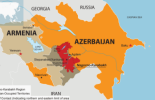
 In 2024 Armenians and their country, Armenia, face existential annihilation, if neighbouring Azerbaijan fulfils its ambition to turn Armenia into "West Azerbaijan," and their Prime Minister (pictured right) continues to betray them. US-NATO countries have supplied arms, not to assist the Armenian army with defending the country, but to help the police suppress popular revolt. [1] Update 9 July: This is a battle against the evil within the Pashinyan government - Archbishop Bagrat Galstanyan
In 2024 Armenians and their country, Armenia, face existential annihilation, if neighbouring Azerbaijan fulfils its ambition to turn Armenia into "West Azerbaijan," and their Prime Minister (pictured right) continues to betray them. US-NATO countries have supplied arms, not to assist the Armenian army with defending the country, but to help the police suppress popular revolt. [1] Update 9 July: This is a battle against the evil within the Pashinyan government - Archbishop Bagrat Galstanyan
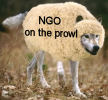 May 28, 2019 U.S. Government Seeks NGO Help For Removing Iran From Syria. The U.S.Department of State is offering a grant of $75,000,000 to non-government-organizations to help it to further meddle in Syria. The grant SFOP0005916 - Supporting Local Governance and Civil Society in Syria will go to "Nonprofits having a 501(c)(3) status with the IRS, other than institutions of higher education".
May 28, 2019 U.S. Government Seeks NGO Help For Removing Iran From Syria. The U.S.Department of State is offering a grant of $75,000,000 to non-government-organizations to help it to further meddle in Syria. The grant SFOP0005916 - Supporting Local Governance and Civil Society in Syria will go to "Nonprofits having a 501(c)(3) status with the IRS, other than institutions of higher education".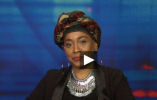
 This article reproduces a leaflet written by Jim Quirk, who was my father. The leaflet advertised a 'Nature Show' at the lower Melbourne Town Hall in 1966. The Field Naturalists Club of Victoria and the Society for Growing Australian Plants sponsored the Nature Show to help the plight and status of the wombat in Australia. I wonder if the same results could be achieved today. Have we advanced at all? Reading of the particularly
This article reproduces a leaflet written by Jim Quirk, who was my father. The leaflet advertised a 'Nature Show' at the lower Melbourne Town Hall in 1966. The Field Naturalists Club of Victoria and the Society for Growing Australian Plants sponsored the Nature Show to help the plight and status of the wombat in Australia. I wonder if the same results could be achieved today. Have we advanced at all? Reading of the particularly 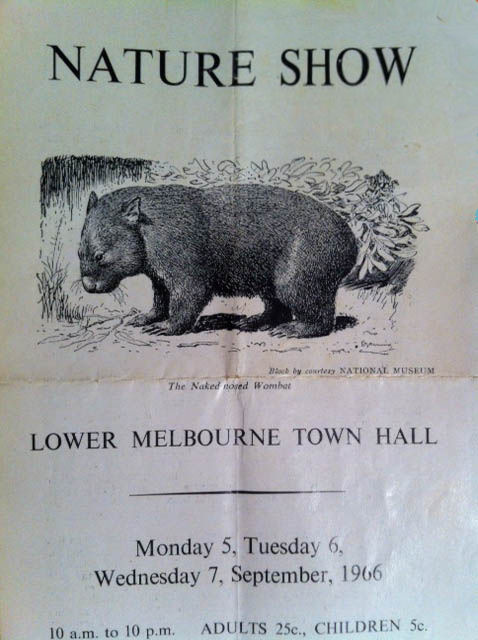
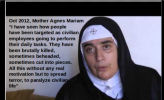 People are becoming more aware of the contradictions in the dominant (official) rhetoric about Syria and foreign intervention on behalf of the rebels. People hope to find out the truth from women and ordinary people, because they know they cannot really trust the mainstream media or, unfortunately, various NGOs and political organisations. Inside, find a link to an interview with Agnes Mariam about about how Syrian women feel about Islamic fundamentalism, and about the very doubtful role of the UN, NGOs and Al Jazeera in this expanding conflict.
People are becoming more aware of the contradictions in the dominant (official) rhetoric about Syria and foreign intervention on behalf of the rebels. People hope to find out the truth from women and ordinary people, because they know they cannot really trust the mainstream media or, unfortunately, various NGOs and political organisations. Inside, find a link to an interview with Agnes Mariam about about how Syrian women feel about Islamic fundamentalism, and about the very doubtful role of the UN, NGOs and Al Jazeera in this expanding conflict.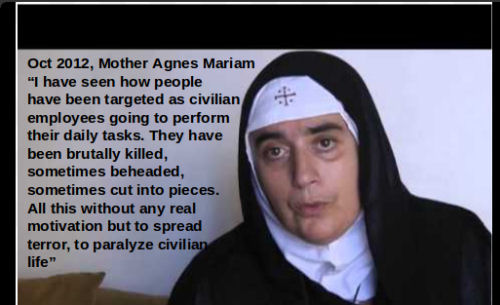
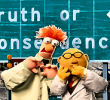 Max Planck's adage should therefore be amended to read that "A new scientific truth does not triumph by convincing its opponents and making them see the light, but rather because its opponents eventually die and a new generation grows up that is familiar with it --- and by being adequately funded and promoted by people who incarnate Dale Carnegie's formula for success."
Max Planck's adage should therefore be amended to read that "A new scientific truth does not triumph by convincing its opponents and making them see the light, but rather because its opponents eventually die and a new generation grows up that is familiar with it --- and by being adequately funded and promoted by people who incarnate Dale Carnegie's formula for success."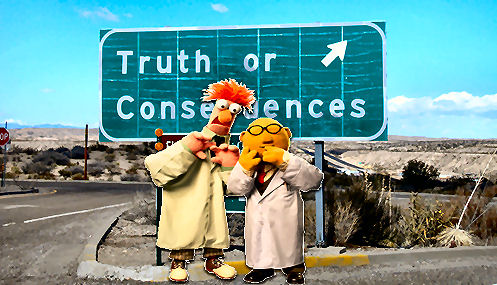
Recent comments